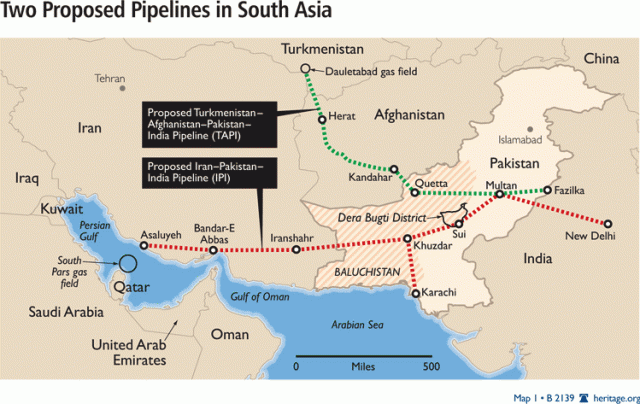M K Bhadrakumar |
The two “peace pipelines” – one carrying Iranian natural gas via Pakistan to India and a second transporting Russian gas via North Korea to South Korea – surfaced as tantalizing ideas roughly a decade ago. They were promptly lampooned as “pipedreams”. But the Russia-DPRK-ROK pipeline (RDR) is having the last laugh on its detractors, thanks to the “thaw” on the Korean Peninsula.
The South Korean President Moon Jae-in telephoned Russian President Vladimir Putin on Sunday to personally brief him on the outcome of the inter-Korean summit in Panmunjom last Friday. The Russian readout says that during the conversation, Putin “reaffirmed Russia’s readiness to continue facilitating practical cooperation between the Republic of Korea and the DPRK, including through major trilateral projects in infrastructure and energy.”
Moscow favorably views Moon’s Trustpolitik, whose logical progression could open the door to Korean unification, elimination of nuclear weapons on the Korean Peninsula and reduce the prospect of a US-led war on Russian borders.
The South Korean media reported that Putin “stressed the need to take advantage of the success of the inter-Korean summit to launch economic cooperation projects between the two Koreas and Russia” and flagged, in particular, that “connecting railways, gas pipelines, and electric power transmission between Russia and the Korean Peninsula via Siberia will contribute to the stability and prosperity of the Korean Peninsula.”
Read more: ‘No longer a villain’: South Koreans fascinated by Kim
Earlier, in a statement in Moscow on Friday, Russian Foreign Ministry had welcomed the Panmunjom summit as “a significant step by Seoul and Pyongyang to national reconciliation and the establishment of strong relationships of independent value.” The statement said, “We are ready to facilitate the establishment of practical cooperation between the DPRK and the Republic of Korea, including through the development of tripartite cooperation in the railway, electricity, gas and other industries.”
Moon understands that Russia is uniquely placed to provide an underpinning for inter-Korean reconciliation in practical terms. A Russian rail-cum-pipeline transiting North Korea toward South Korea is a “win-win” project. Russia is a gas superpower, while the two Koreas are dependent on energy imports.
An RDR gas pipeline was discussed in 2011 during a rare visit by the North Korean leader Kim Jong-Il to Russia with then-President Dmitry Medvedev at a summit in Ulan-Ude near Lake Baikal in Siberia. They reportedly discussed a pipeline that will send natural gas from Sakhalin Island to South Korea. Russia had previously discussed this idea during a summit at Moscow between the then South Korean President Lee Myung-bak and Medvedev in 2008.
The South Korean President Moon Jae-in telephoned Russian President Vladimir Putin on Sunday to personally brief him on the outcome of the inter-Korean summit in Panmunjom last Friday.
Seoul can expect huge economic benefits as it would receive gas from Russia on a cheap and stable basis. Gas accounts for one-seventh of its energy consumption. The project held the potential to bring North Korea at least $100 million annually as transit fee alone, apart from giving access to much-needed access to energy at a cheap price. Besides, of course, the RDR would help stabilize the inter-Korean ties.
Read more: North Korea’s nuclear declaration: what it does and does not mean
The fly in the ointment is going to be the United States. Simply put, RDR may fuel regional integration, which can hurt US interests. It remains to be seen how the US can stop the RDR except by undermining the dynamics of the Korean reconciliation. But Moon is a leftist politician and taps into the deep yearning for Korean reconciliation among the South Korean people. Moon is tactful and is making it look as if Donald Trump’s “maximum pressure” approach is working, while in reality pushing his normalization plans vis-à-vis North Korea.
When Moon met Putin in September last year on the sidelines of the Eastern Economic Forum at Vladivostok, there was a discussion on South Korean investment in the development of Siberia and Russian Far East. A month ago, South Korean Foreign Minister Kang Kyung-wha said that the normalization of the North Korean crisis might pave the way for resuming the project involving the construction of a gas pipeline that would connect Russia and the two Koreas. During Sunday’s conversation, Putin invited Moon to visit Russia during the FIFA World Cup in June-July. South Koreans are crazy about football.
From the Russian perspective, RDR’s main attraction lies in the potential for integration of the South Korean and Russian economies. (A parallel Trans-Korean Railway project is expected to be connected to Russia’s Trans-Siberian Railway.) Quite obviously, Russia gains significant advantages through a privileged transportation link to the LNG market in the Asia-Pacific. Thus, Moscow favorably views Moon’s Trustpolitik, whose logical progression could open the door to Korean unification, elimination of nuclear weapons on the Korean Peninsula and reduce the prospect of a US-led war on Russian borders.
Read more: New role for wife of North Korea’s Kim: First Lady
Looking ahead, South Korean society is already divided on the presence of the US military. South Korea demonstrates greater foreign policy autonomy than Japan – and is less devoted to the rivalry between the US and China than Japan. South Korea refused to yield to US pressure to apply sanctions against Russia.
M. K. Bhadrakumar has served as a career diplomat in the Indian Foreign Service for over 29 years, with postings as India’s ambassador to Uzbekistan (1995-1998) and to Turkey (1998-2001). He writes extensively in Indian newspapers, Asia Times and the “Indian Punchline”. This piece was first published in Indian Punchline. The views expressed in this article are the author’s own and do not necessarily reflect Global Village Space’s editorial policy.














